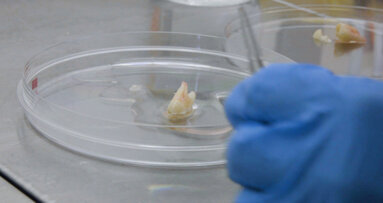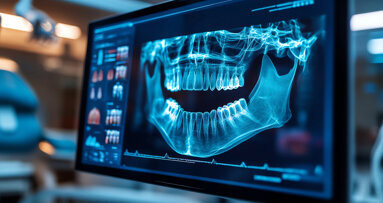FRANKFURT AM MAIN, Germany: While the mechanism underlying loss of consciousness in anaesthesia is not known, it has been hypothesised that it is due to interrupted transmission on nerve fibres coupling brain areas, affecting their ability to communicate with each other. Neuroscientists have now discovered that certain areas of the brain generate less information under anaesthesia. The drop in information could be a consequence of reduced local information generation in the brain.
Researchers at Goethe University Frankfurt and the Max Planck Institute in Göttingen in Germany and the University of North Carolina at Chapel Hill in the US have now investigated this new hypothesis. The research team, led by Patricia Wollstadt and Dr Flavio Fröhlich, examined sources in ferret brain areas from which less information was transmitted under anaesthesia.
They found that information generation under anaesthesia was far more affected there than in the target brain areas to which the information was transferred. This indicates that it is the information available in the source area that determines information transfer and not a disruption in signal transmission. With the latter being the case, a far greater reduction could be expected in the target areas, since less information arrives there.
“The relevance of this alternative explanation goes beyond anesthesia research,” said Wollstadt, “since each and every examination of neuronal information transfer should categorically take into consideration how much information is available locally and is therefore also transferable.”
The study, titled “Breakdown of local information processing may underlie isoflurane anesthesia effects”, was published online on 1 June in the PLOS Computational Biology journal.
Tags:
FAYETTEVILLE, Ark., U.S.: Food leaves permanent traces on teeth. Examining these marks—or microwear—a team of researchers has documented the effects of ...
BERLIN, Germany: For certain animals, the loss of teeth does not always pose a problem: sharks and crocodiles have the ability to regrow their teeth ...
PENNSYLVANIA, U.S.: Child obesity throughout the Western world is becoming more of a common problem. In a new study that may help our comprehension of the ...
STONY BROOK, N.Y., US: The applicability and efficacy of artificial intelligence (AI) within dentistry appears to be limitless. With each passing day, ...
STATE COLLEGE, Pa., U.S.: For a long time, people have known that individual differences in taste and smell can have an influence on liking or disliking a ...
DUNEDIN, New Zealand: In a new study researchers have found a connection between diets with high intakes of fibre and wholegrain foods and a reduction in ...
DUNEDIN, New Zealand: Dental anxiety continues to be a significant impediment to patients receiving dental care, and minimally invasive approaches have ...
Dental Tribune International attended the recent European Aligner Society’s congress on the island of Rhodes in Greece and had the opportunity to speak to...
In an interview at the International Dental Show (IDS), Christoph Weiss, managing director of BEGO, and Dr Alexander Faber, director of sales, talk about ...
Kraków, Poland: Seamless and streamlined cooperation between dentists and dental technicians is a recipe for success. In Japanese, “kizuna” describes a...
Live webinar
Wed. 25 February 2026
8:00 pm EST (New York)
Live webinar
Tue. 3 March 2026
11:00 am EST (New York)
Dr. Omar Lugo Cirujano Maxilofacial
Live webinar
Tue. 3 March 2026
8:00 pm EST (New York)
Dr. Vasiliki Maseli DDS, MS, EdM
Live webinar
Wed. 4 March 2026
12:00 pm EST (New York)
Munther Sulieman LDS RCS (Eng) BDS (Lond) MSc PhD
Live webinar
Wed. 4 March 2026
1:00 pm EST (New York)
Live webinar
Fri. 6 March 2026
3:00 am EST (New York)
Live webinar
Tue. 10 March 2026
4:00 am EST (New York)
Assoc. Prof. Aaron Davis, Prof. Sarah Baker



 Austria / Österreich
Austria / Österreich
 Bosnia and Herzegovina / Босна и Херцеговина
Bosnia and Herzegovina / Босна и Херцеговина
 Bulgaria / България
Bulgaria / България
 Croatia / Hrvatska
Croatia / Hrvatska
 Czech Republic & Slovakia / Česká republika & Slovensko
Czech Republic & Slovakia / Česká republika & Slovensko
 France / France
France / France
 Germany / Deutschland
Germany / Deutschland
 Greece / ΕΛΛΑΔΑ
Greece / ΕΛΛΑΔΑ
 Hungary / Hungary
Hungary / Hungary
 Italy / Italia
Italy / Italia
 Netherlands / Nederland
Netherlands / Nederland
 Nordic / Nordic
Nordic / Nordic
 Poland / Polska
Poland / Polska
 Portugal / Portugal
Portugal / Portugal
 Romania & Moldova / România & Moldova
Romania & Moldova / România & Moldova
 Slovenia / Slovenija
Slovenia / Slovenija
 Serbia & Montenegro / Србија и Црна Гора
Serbia & Montenegro / Србија и Црна Гора
 Spain / España
Spain / España
 Switzerland / Schweiz
Switzerland / Schweiz
 Turkey / Türkiye
Turkey / Türkiye
 UK & Ireland / UK & Ireland
UK & Ireland / UK & Ireland
 Brazil / Brasil
Brazil / Brasil
 Canada / Canada
Canada / Canada
 Latin America / Latinoamérica
Latin America / Latinoamérica
 USA / USA
USA / USA
 China / 中国
China / 中国
 India / भारत गणराज्य
India / भारत गणराज्य
 Pakistan / Pākistān
Pakistan / Pākistān
 Vietnam / Việt Nam
Vietnam / Việt Nam
 ASEAN / ASEAN
ASEAN / ASEAN
 Israel / מְדִינַת יִשְׂרָאֵל
Israel / מְדִינַת יִשְׂרָאֵל
 Algeria, Morocco & Tunisia / الجزائر والمغرب وتونس
Algeria, Morocco & Tunisia / الجزائر والمغرب وتونس
 Middle East / Middle East
Middle East / Middle East













































To post a reply please login or register